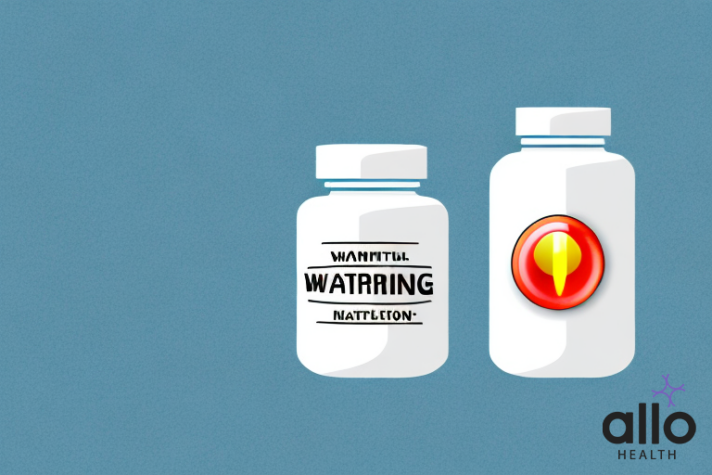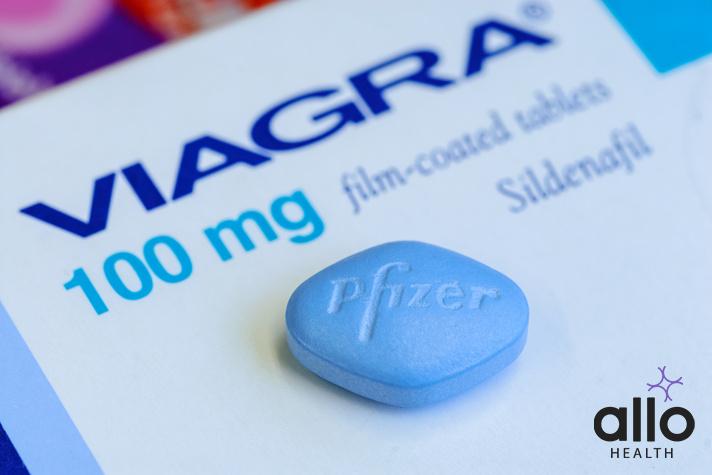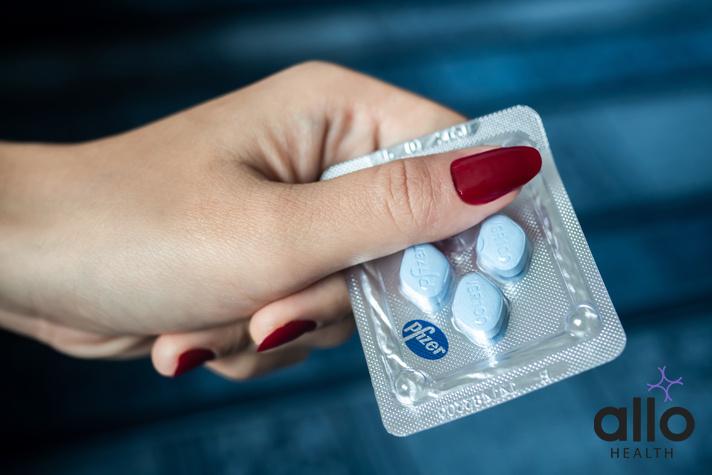Can Viagra Overdose Kill You?

Allo Health is dedicated to personalized well-being, offering support and trusted information tailored to individual health goals. The platform emphasizes human-generated content, led by a distinguished medical team of experts, including physicians and sexual health specialists. Their commitment to credibility involves rigorous fact-checking, authoritative research, and continuous updates to ensure accurate, up-to-date information. Allo Health's unique approach goes beyond conventional platforms, providing expert-led insights and a continuous commitment to excellence, with user feedback playing a crucial role in shaping the platform's authoritative voice.

Dr. Aditi completed her undergraduate medical education at AJIMS, Mangalore, after which she worked in multi-speciality hospitals with COVID patients and in the Pain and Palliative medicine department. Driven by her experiences, she developed a keen interest in psychiatry. Dr. Aditi believes that mental health is just as, if not more important, than physical health.
Why This Was Upated?
Our experts continually monitor the health and wellness space, and we update our articles when new information became available.
Updated on 02 June, 2024
- Article was updated as part of our commitment to diversity, equity, and inclusion.

"The following blog article provides information about a drug or brand name drug and its potential effects or benefits. However, it is crucial to understand that this information is intended for general educational purposes only and should not be considered a substitute for professional medical consultation. It is highly recommended to consult with a qualified healthcare professional before making any decisions regarding medication, treatment, or healthcare management.
Book consultation
Individuals have unique medical conditions, and the information provided in this article may not be applicable to everyone. Only a qualified healthcare provider can evaluate your specific medical situation, taking into account your medical history, conducting appropriate tests, and providing personalized advice and recommendations. They are equipped to make informed decisions tailored to your individual needs.
It is crucial to emphasize that self-diagnosis, self-medication, or disregarding medical advice can have serious health consequences. This article may reference specific brand names or drugs for illustrative purposes. Mention of these names does not imply endorsement, recommendation, or guarantee of their efficacy or safety. The choice of medication should be based on discussions and individualized guidance from a healthcare professional who has a comprehensive understanding of your medical condition.
"Viagra has gained widespread recognition for its ability to treat erectile dysfunction and has become a popular name. But like any potent drug, it is not without side effects and precautions.
In this article, we’ll explore the dosage instructions for Viagra and whether an overdose can kill you.
What is Viagra?
Viagra, a brand name for the generic drug sildenafil, is a medication primarily used to treat erectile dysfunction (ED). Erectile dysfunction is a common condition wherein a man experiences difficulty achieving or maintaining an erection sufficient for sexual activity. Viagra belongs to a class of drugs known as phosphodiesterase type 5 (PDE5) inhibitors.
Mechanism of Action: The mechanism of action of Viagra (sildenafil) revolves around its ability to inhibit an enzyme known as phosphodiesterase type 5 (PDE5). This enzyme is primarily found in the smooth muscle cells of the penis and the walls of blood vessels.
- Initiation of Sexual Stimulation: The process begins with sexual arousal or stimulation. This can be through physical touch, visual stimuli, or other forms of sexual excitement.
- Release of Nitric Oxide: Sexual arousal prompts the release of nitric oxide (NO) in the erectile tissue of the penis. Nitric oxide, in turn, activates an enzyme called guanylate cyclase.
- Increase in cGMP Levels: Guanylate cyclase converts guanosine triphosphate (GTP) into cyclic guanosine monophosphate (cGMP). cGMP serves as a messenger that facilitates the relaxation of smooth muscles in the penile arteries and corpus cavernosum (erectile tissue).
- Role of PDE5: Normally, the effects of cGMP are regulated by the enzyme phosphodiesterase type 5 (PDE5), which breaks down cGMP, leading to a reduction in its levels.
- Inhibition of PDE5 by Viagra: Viagra is a PDE5 inhibitor. When administered, it blocks the action of PDE5, allowing cGMP to accumulate and persist in the erectile tissue.
- Smooth Muscle Relaxation: With elevated levels of cGMP, the smooth muscles in the penile arteries and corpus cavernosum relax. This relaxation enhances blood flow to the penis.
- Increased Blood Flow and Erection: The increased blood flow to the penis results in engorgement of the erectile tissue, leading to an erection that is sufficient for sexual activity.

The mechanism of action of Viagra is dependent on sexual stimulation. Without sexual arousal, the medication alone does not induce an erection. Additionally, the duration of Viagra’s effects is limited, typically lasting for a few hours.
Side Effects
Common Side Effects:
- Headache
- Flushing (redness and warmth in the face or chest)
- Upset stomach or indigestion
- Nasal congestion
- Dizziness or lightheadedness
- Vision changes (such as increased sensitivity to light, blurred vision)
Less Common Side Effects:
- Back pain
- Muscle pain or discomfort
- Nausea
- Rash
Serious Adverse Effects (Rare):
- Sudden loss of vision in one or both eyes
- Sudden hearing loss or decrease in hearing
- Prolonged or painful erection lasting more than four hours (priapism)
- Chest pain or discomfort, and symptoms of a heart attack
- Allergic reactions (rash, itching/swelling, severe dizziness, difficulty breathing/ shortness of breath)
Note: This list of unwanted side effects is not exhaustive, and individual responses to medication can vary. If you experience any severe or persistent side effects, it’s crucial to seek prompt medical attention. Read more on the side effects of Viagra here.
Dosage Instructions
- The typical starting dose is 50 milligrams (mg) taken approximately one hour before sexual intercourse or anticipated sexual activity.
- Depending on effectiveness and tolerance, the dose can be increased to a maximum of 100 mg or decreased to 25 mg.
- It’s usually recommended to take Viagra on an empty stomach with a glass of water, as a high-fat meal may delay the onset of action.
- For elderly individuals or those with liver or kidney impairment, a lower starting dose (25 mg) may be recommended.
- Viagra should be taken only once a day (single dose), as needed, before sexual activity.
- Sexual arousal is necessary for the medication to be effective.
- It’s essential to follow the prescribed dosage and not exceed the recommended amount.
- If you miss a dose, take it as soon as you remember. However, if it’s almost time for the next dose, skip the missed dose and continue with the regular schedule.
What is considered an overdose of Viagra? An overdose of Viagra (sildenafil) occurs when the medication is taken in excess of the prescribed dosage or when an individual takes more than one dose within the recommended timeframe. It’s crucial to adhere strictly to the prescribed dosage provided by your healthcare provider.
The standard recommended dose of Viagra for most individuals is 50 milligrams, taken approximately one hour before sexual activity. Depending on the effectiveness and tolerability, the dose may be adjusted to a maximum of 100 mg or decreased to 25 mg.
Can Viagra Overdose Kill you?
While Viagra (sildenafil) is generally safe when used as prescribed, taking an excessive amount of the medication can lead to serious complications, and in extreme cases, it can be life-threatening. An overdose of Viagra may increase the risk of experiencing severe side effects, including those affecting the cardiovascular system.

Symptoms of a Viagra overdose may include:
- Severe headache
- Dizziness or lightheadedness
- Fainting
- Irregular heartbeat or chest pain
- Priapism (prolonged and painful erection)
Priapism, in particular, is considered a medical emergency. If not treated promptly, priapism can lead to permanent damage to the penis.
While the risk of a fatal outcome from a Viagra overdose is relatively low, it underscores the importance of using the medication responsibly and strictly adhering to the prescribed dosage. If you suspect an overdose or experience severe side effects, seek immediate medical attention.
Viagra is a prescription medication, and its use should be guided by a healthcare professional who considers individual health factors. Never self-adjust the dosage or take more than the prescribed amount.
How Can Viagra Overdose Kill you?
While fatal outcomes from a Viagra (sildenafil) overdose are extremely rare, taking an excessive amount of the medication can lead to severe complications, particularly those affecting the cardiovascular system. Here are some ways in which a Viagra overdose could potentially be harmful or, in rare cases, lead to a life-threatening situation:
- Cardiovascular Effects: Viagra primarily works by dilating blood vessels, which can lead to a decrease in blood pressure. In the case of an overdose, the excessive vasodilation may cause a significant drop in blood pressure, leading to hypotension. Severe hypotension can result in decreased blood flow to vital organs, such as the brain and heart, potentially leading to serious complications.
- Arrhythmias: An overdose may also increase the risk of abnormal heart rhythms (arrhythmias). The cardiovascular effects of Viagra, when taken in excess, could contribute to irregular heartbeats, which may be dangerous for individuals with pre-existing heart conditions.
- Interaction with Other Medications: Taking a higher-than-prescribed dose of Viagra can increase the risk of interactions with other medications a person may be taking. This is especially concerning if an individual is on medications that affect blood pressure or heart function.
Always follow prescribed dosage instructions by your medical professional.
Key Takeaways
- Viagra, a popular medication for treating erectile dysfunction, is not without side effects and precautions.
- The mechanism of action involves inhibiting the enzyme PDE5, promoting smooth muscle relaxation and increased blood flow for an erection during sexual stimulation.
- Common side effects include headache, flushing, upset stomach, and less commonly, back pain or rash.
- Dosage instructions recommend starting with 50 mg, with adjustments based on effectiveness and tolerance.
- An overdose of Viagra, though rare, can lead to severe complications, including cardiovascular effects and priapism.
- While fatal outcomes from a Viagra overdose are extremely rare, it is not impossible. This emphasizes the importance of using the medication responsibly and following prescribed dosages.
Frequently Asked Questions
Q: Can Viagra cause a prolonged and painful erection (priapism)?
A: Yes, priapism is a rare but serious complication of Viagra. If an erection lasts for more than four hours, seek immediate medical attention to prevent potential damage to the penis.
Q: Are there cardiovascular complications associated with Viagra use?
A: In some cases, Viagra can cause a drop in blood pressure, leading to dizziness or fainting. Individuals with pre-existing cardiovascular conditions should consult their healthcare provider before using Viagra.
Q: What should I do if I experience sudden vision or hearing loss while taking Viagra?
A: Sudden vision or hearing loss is a rare but serious side effect. Discontinue the use of Viagra and seek prompt medical attention if such symptoms occur.
Q: Can Viagra interact with other medications I’m taking?
A: Yes, Viagra can interact with certain medications, especially those containing nitrates or used to treat heart conditions. Inform your healthcare provider about all medications you are taking to avoid potential complications.
Q: Is it safe to consume alcohol while taking Viagra?
A: While moderate alcohol consumption is generally considered safe, excessive alcohol intake can increase the risk of side effects and may affect the effectiveness of Viagra. It’s advisable to limit alcohol intake when using the medication.






































